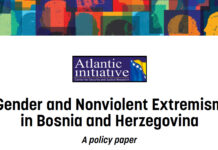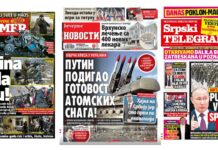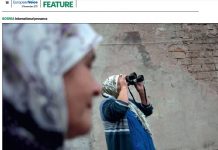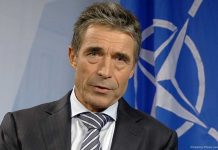Dear Dr. Schmidt, Mr Polenz, Excellencies,Ladies and Gentlemen,
I very much appreciate the invitation to speak to you today, for two reasons.
First, because I was a Parliamentarian for over 30 years and have always enjoyed the special atmosphere and discussions of parliament. And second, because I appreciate the opportunity to answer the question you have put on the table – is NATO a Cold War relic, or an instrument for peace?
Let me answer that question straight away. NATO was, is, and will remain an instrument for peace.
Through our operations, we are defending peace. Through our cooperative approach to security, we are promoting peace.
Through our engagement in crisis management, we are preserving peace.
And I believe that NATO’s record proves that, beyond any doubt.
During the Cold War, NATO Allies stood side-by-side to defend freedom and democracy. Through their solidarity, and by sharing the burden of defence, NATO Allies successfully prevented the Cold War from getting hot. And we did not just win the Cold War – we also won the peace. A peace that helped to bring together this country, as well as our continent.
Managing the break-up of the Former Yugoslavia was the next step in consolidating peace in Europe. In Bosnia, in Kosovo, and in the Former Yugoslav Republic of Macedonia¹, NATO-led forces have helped manage crises and build stability. Today, the NATO-led KFOR is trusted, and recognised, by all parties as an impartial peacekeeper. In fact, NATO is today the most effective peacekeeper in the world.
After the atrocities of 9/11, NATO invoked Article 5 of its founding treaty. The core article of the NATO Treaty, which states, that an attack on one Ally is considered an attack on all Allies. Because our fundamental security was threatened from a new source – international terrorism. And the whole international community agreed that, to preserve our security against this menace, we have to prevent Afghanistan from becoming a safe haven for terrorists once again.
For the past seven years, NATO has been leading the International Security Assistance Force in Afghanistan. And let me stress: We are there, under successive United Nations mandates. We are there to assist the Afghan government in the establishment of a secure and stable environment. We want to help Afghanistan to become a country that will never again be a safe haven and training ground for terrorists that menace Afghanistan, the region and our citizens here as well.
This is not an easy mission, by any standards. Many ISAF countries – including Germany — have suffered casualties. Let me take this opportunity here to express my condolences to the families and loved ones of the German soldiers who have lost their lives.
But those sacrifices have not been in vain. Our mission is making a difference.
Al Qaeda has no safe haven anywhere in Afghanistan. The Taliban are under pressure everywhere in Afghanistan. And as you’ve seen, Afghan-led efforts to find a political solution are picking up steam, reinforced by the success of our military operations.
We are also helping to make Afghanistan, as a society, resistant to terrorism. Most Afghans now have access to health care and education. There are millions of girls in school, more than ever before. Thousands of refugees have returned home. More and more roads are connecting the major cities, enabling people to travel and businesses to flourish. Political life is flourishing too, with more and more young men and women committed to creating a better future for their country. And there is a vibrant and free media holding the Afghan authorities and international organisations to account.
This is all good news. But more needs to be done to build on these successes. We have learnt that if we want to achieve lasting success in operations like these, then we also need to improve our capacity to promote reconstruction and development.
Do not get me wrong. I am not suggesting that NATO should be looking to take the lead in reconstruction and development. But I do believe we need to improve our ability to interact with organisations and institutions that do have the right type of civilian expertise and capacity. Organisations such as the United Nations and the European Union.
The United Nations is assisting the Government of Afghanistan and its people to lay the foundations for sustainable peace and development. We have seen how important it is that achievements in the security domain be quickly reinforced by reconstruction, and over the longer term by development. ISAF makes an important contribution through its Provincial Reconstruction Teams. But the main contribution to development is led by the United Nations. Our two organisations – NATO and the United Nations – need to ensure our work is better coordinated.

The European Union and its member states also have a vital role in fostering stability and security in Afghanistan. They have committed over €8 billion of aid to Afghanistan since 2002. They have deployed a police mission, EUPOL, to help Afghans take responsibility for law and order. And they are making a major contribution to reconstruction too. But here as well, I believe we are not yet delivering the coordinated civilian and military approach that the situation requires.
To put it in simple terms, we need to make sure our military efforts and the reconstruction and development efforts of other organisations are mutually reinforcing. We need to implement a true Comprehensive Approach.
Now this makes perfect sense in theory. But it has been difficult to put into practice. Each player, civilian and military, has tended to operate with his own structures and methods, and at his own pace – which has meant the combined impact of our efforts has remained much less than what it could be — and should be.
So how do we break through this? How can NATO help to deliver a truly effective comprehensive approach – not only for Afghanistan, but also for other crises?
First, we need to improve our links to other organisations and relevant authorities, and to ensure we can interact more closely with them. I am also convinced that in certain circumstances, NATO needs to have the capability to take on, temporarily, certain urgent stabilisation and reconstruction tasks.
There will be times when the necessary civilian actors are not yet deployed on the ground. Or when they are not able to operate, because of a hostile security environment. In such circumstances, NATO should be able to fill the gaps in the delivery of stabilisation and reconstruction, just until other civilian organisations are able to arrive and step in. Because we cannot afford to ignore half of what is required to make our efforts succeed.
Ladies and Gentlemen.
Many other nations face the same security challenges as NATO, such as terrorism, proliferation, and the problems caused by instability. To address the global challenges successfully, NATO and these nations need also to cooperate more broadly and more deeply. If we want to promote peace and security, then we need cooperative security – we need to cooperate with partners across the globe.
I believe that NATO should become a forum for consultation on international security issues – the place where views, concerns and best practices on security are shared among global partners. And where we can work out, how best to tackle common challenges together.
I realise that this idea might seem ambitious. But is it really?
Who would suffer if our partners in Europe, Central Asia, North Africa and the Middle East were to deepen their cooperation with NATO?
Who stands to lose if countries such as China, India and Pakistan were to engage in a closer dialogue with NATO?
Who would be hurt if Asian-Pacific countries like Australia, New Zealand, Japan and South Korea were to enhance their consultations with NATO?
On the contrary — I believe that such a cooperative approach to security would benefit international security, and reinforce the principles of the UN Charter.
I also see cooperative security as the key to ensuring peace and stability in the Euro-Atlantic area – particularly with Russia. NATO nations and Russia share many common interests, from fighting terrorism, narcotics and piracy to stabilising Afghanistan. And I am pleased that President Medvedev has accepted my invitation to participate in a NATO-Russia Council Summit in Lisbon next month.
It will be an important opportunity to deepen and broaden our political dialogue and practical cooperation across the range of our common interests. I also hope it will be an opportunity to give a real boost to our partnership, by deciding to cooperate on missile defence.
Today, over 30 countries have, or are acquiring, missiles that could be used to carry not just conventional, but also nuclear warheads. We cannot turn a blind eye to this problem. It is real. It is growing. And it threatens not just NATO nations, but Russia too. We cannot afford to have even one of our cities hit by these missiles. Nor can we afford to be held hostage by the threat of an such attack.
I hope that, at our summit in Lisbon, NATO Heads of State and Government will take the decision, as an Alliance, to build the capability to protect European populations and territory against missile attack. And I also hope that such a decision will go together with a clear offer to Russia to cooperate and to benefit.
Allied and Russian participation in a territorial missile defence system would create a true Euro-Atlantic security architecture. It would provide one security roof across Europe. It would be a major step in achieving our goal of a genuine strategic partnership between NATO and Russia. And it would be a further, powerful demonstration that cooperative security is the key for building peace and stability on this continent.
Ladies and Gentlemen,
At our Summit in Lisbon next month, NATO will adopt a new Strategic Concept.
- It will lay out the vision for our Alliance for the next decade.
- It will be the lever for reform and transformation.
- It will frame the new NATO.
An Alliance able to defend its members against modern threats.
An Alliance capable of managing even the most challenging crises.
An Alliance better able to work with other organisations and nations to promote international stability.
An Alliance that will continue to serve as an essential instrument for peace in the twenty-first century.
Thank you very much.
A.F. Rasmussen
22. 10. 2010.
Source: http://www.nato.int/cps/en/natolive/opinions_67304.htm








